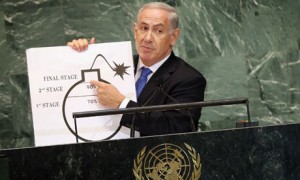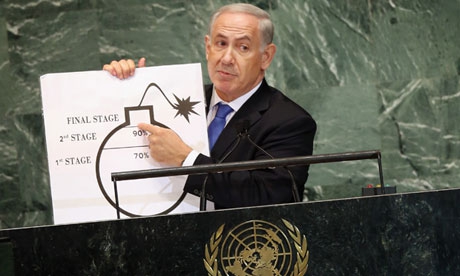
Military's decision to allow TV documentary revealing deep divisions over Iran policy to air could be attempt to portray political leaders as reckless
This is not the first time�Israel's political and security establishments have been at loggerheads, and it will not be the last. It comes with the territory for a country that has spent so much of its existence in conflict and has a long tradition of feisty generals. But what is spectacular about the rift over�Iran�is the high stakes and the fact that it has become so public so soon.
The events recounted in the Israeli television documentary�took place two years ago but that is fresh enough for them, in normal circumstances, to be blacked out by the military censor. Yet this programme � involving a disconnect, to say the least, between the heads of the Mossad and the Israeli Defence Force (IDF) on one hand, and the prime minister and defence minister on the other, on a matter of vital national security � is being broadcast with the protagonists expressing their views on air two months before elections. It is possible it has been allowed to run by the military to convey to voters, who are generally highly respectful of men and women in uniform, that the current political leadership is reckless.
When Israel bombed Iraq's Osirak nuclear reactor in 1981, Menachem Begin overruled the heads of the Mossad and military intelligence who feared an international backlash. This time it is the prime minister who blinked. After warning for months that Israeli action could not be put off, Binyamin Netanyahu told the UN general assembly in September that the moment of truth for the Iranian nuclear programme would come next spring or summer.
Neither Meir Dagan nor Gabi Ashkenazi are still in office, but it appears their successors also have reservations about the wisdom of Israel attempting military action on its own. Benny Gatz�went on the record in April�to differ with Netanyahu on what constituted Israel's "red line".
"The current head of Mossad and the chief of staff are still not on the same page on this issue it seems to me," said Yossi Alpher, a former Iran analyst at the Mossad. "As recently as six months ago they presented a picture quite different from that presented by Netanyahu and Barak."
"Meanwhile, Netanyahu has taken it off the agenda until spring and summer. This is about the influence of American pressure, opposition within the ranks, possible a change of mind by Barak � And he has seen from his own polling that the Israeli public is not in favour of a unilateral strike. This has calmed things down and there has been no perceived need for the heads of the security services to speak out about this recently."
What to do about Iran's nuclear programme will be one of the issues hanging over Israel's elections on 22 January next year. How important it will be will depend on who takes part. If former prime minister Ehud Olmert and former foreign minister Tzipi Livni enter the ring, they are likely to attack Netanyahu as a loose cannon on Iran. Ashkenazi himself might also figure as an adviser or minister-designate for Olmert or Labour.
But as Iran's nuclear programme advances, and as the country increases its stockpile of 20%-enriched uranium (the central proliferation concern) the gaps between the politicians and the security establishment will shrink, argues Danny Yatom, a former Mossad chief.
"There is a mutual understanding that Iran should not be nuclear, and I believe all the players share the belief that Iran will be nuclear when it has enough 20%-enriched uranium for a weapon," Yatom said.
The Iran Project is not responsible for the content of quoted articles.











